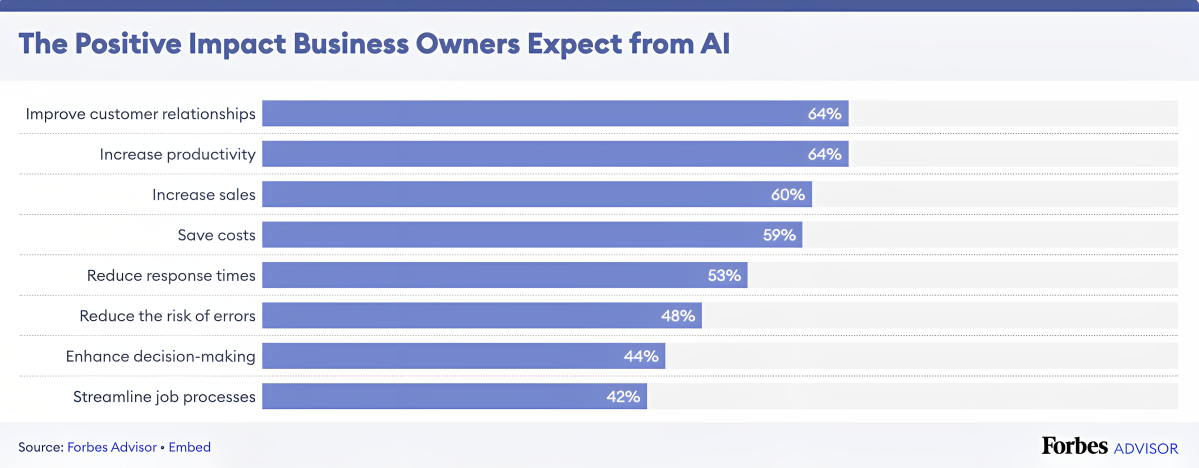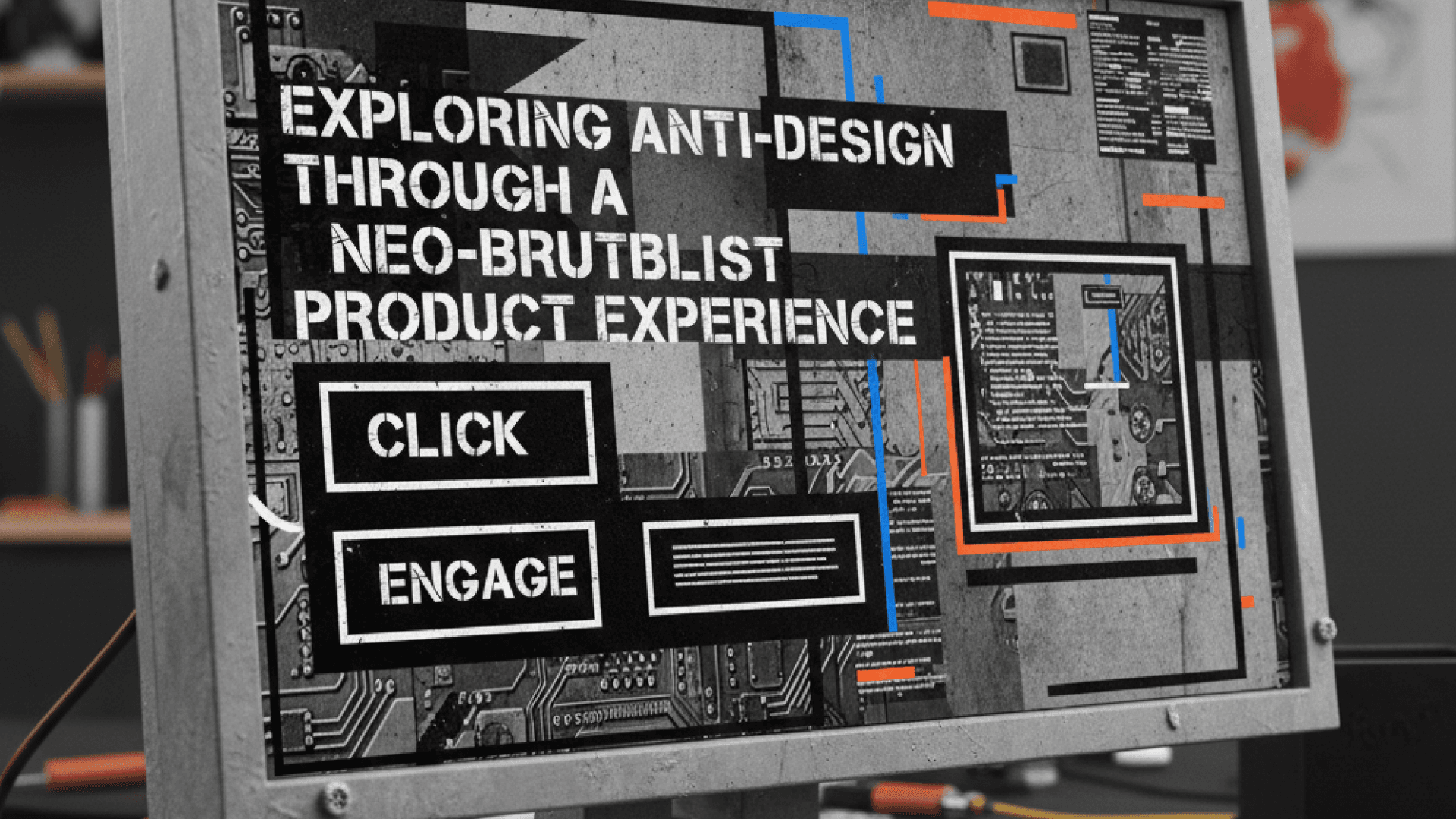Table of Contents
Do You Want to Use AI for Your Business? GeekyAnts Can Help
Author

Subject Matter Expert


Date

Book a call
As with any technology that has the potential to shake industries, every company wants to leverage AI. Tools like ChatGPT, DALL-E, and MidJourney are staples in any workflow. But how many are doing it right? In reality, not many.
According to a Forbes Advisor survey, businesses use AI in various ways to enhance their operations, improve efficiency, and provide better customer service. 64% of business owners believe AI can improve customer relationships and productivity, while 59% are positive about the technology’s cost-saving benefits. But translating the hype to results is easier said than done.
In this article, we explain how companies can use AI in their workflows the correct way.
A Step-by-Step Guide to Incorporating AI into Your Business

Like with any other technology, a successful and beneficial AI integration requires companies to carefully consider several key factors. What gaps in your business can AI fill? How will you align the technology with your business needs? How can you use AI ethically? How to measure its success? You should be able to answer these questions in order to have a clear idea about your specific requirements.
- Define Objectives: Identify the specific business problems or opportunities where AI can add value. Determine the goals you want to achieve through AI implementation, such as improving customer service, optimising supply chains, or enhancing data analysis.
- Data Collection and Preparation: AI relies on high-quality data to deliver accurate and meaningful results. Ensure you have access to relevant and comprehensive data that is properly structured and cleansed for AI analysis.
- Identify AI Applications: Explore the various AI technologies and applications available and choose the ones that align with your business objectives. Common AI applications include natural language processing (NLP)—think chatbots and smart assistants, machine learning (predictive analytics, facial/voice recognition), computer vision, and robotic process automation (RPA)—examples include employee onboarding and call centre operations.
- AI Infrastructure: Invest in the necessary hardware and software infrastructure to support AI initiatives. This may include powerful servers or cloud computing platforms capable of handling AI workloads.
- Data Science Team: Build or hire a skilled data science team capable of developing and implementing AI models. Data scientists and AI experts are essential for creating and training AI algorithms.
- AI Development and Integration: Develop AI models tailored to your specific use cases. For instance, you might create a recommendation system, a chatbot, or a predictive analytics model. Integrate these AI solutions into your existing systems and processes seamlessly. To decide whether you want to select custom AI solutions or off-the-shelf AI tools, you can refer to the table below.
Custom AI Solutions Vs. Off-the-Shelf AI Tools
| Custom AI Solutions | Off-the-Shelf AI Tools |
|---|---|
| Tailored to Specific Needs: | Quick Implementation: |
| Custom AI solutions are built from scratch to address the unique requirements and challenges of the business. They can be designed to align precisely with the organisation's processes, workflows, and data. | Off-the-shelf AI tools are readily available and can be quickly integrated into existing systems. They come with pre-built functionalities and are often user-friendly. |
| High Development Cost and Time: | Cost-Effective: |
| Building a custom AI solution requires substantial time, effort, and investment. | Compared to custom solutions, off-the-shelf tools can be more cost-effective, as they eliminate the need for extensive development and maintenance. |
| Competitive Advantage: | Proven Performance: |
| By developing a unique AI solution, a company can gain a competitive edge in the market. Custom solutions can provide capabilities that are not available in off-the-shelf tools, offering a distinct value proposition. | Reputable off-the-shelf AI tools have already been tested and used by multiple organisations, providing some level of validation for their effectiveness. |
| Data Privacy and Security: | Data Privacy Concerns: |
| Custom solutions offer better control over data privacy and security, as sensitive information is handled within the organisation's infrastructure. | Using third-party tools means sharing data with external providers, which can raise data privacy and security concerns. |
| Flexibility and Scalability: | Limited Customisation: |
| Custom solutions offer greater flexibility, allowing businesses to add or modify features as their needs evolve. They can scale to accommodate growing data volumes and evolving business goals. | While some configuration options may be available, off-the-shelf tools are generally less customisable than custom solutions. They may not perfectly align with all business processes. |
| Need for AI Expertise: | Potential Dependency: |
| Developing custom AI solutions necessitates a skilled team of data scientists, machine learning engineers, and AI specialists. | Relying solely on third-party tools can create a dependency on their continued availability and support, which may become an issue if the provider changes or discontinues the tool. |
- Test and Validate: Thoroughly test the AI models to ensure they deliver accurate and reliable results. Validate the AI outputs against known benchmarks and real-world data to verify their effectiveness.
- AI Security and Ethics: Address data privacy and security concerns related to AI implementation. Ensure compliance with relevant regulations and ethical considerations regarding data usage and AI decision-making.
- Training and Adoption: Train your employees to effectively use AI tools and solutions. Encourage a culture of AI adoption within the organisation and promote its benefits among the workforce.
- Continuous Improvement: AI is not a one-time implementation; it requires continuous monitoring, updates, and improvements. Regularly review AI performance, gather feedback, and fine-tune the models to optimise their efficacy.
- Scale Gradually: Start with pilot projects and gradually scale AI initiatives based on their success and impact. Scaling AI projects incrementally allows the organisation to learn from each phase and make necessary adjustments.
- Monitor ROI: Continuously monitor the return on investment (ROI) of your AI initiatives. Measure their impact on key performance indicators (KPIs) and make data-driven decisions about future AI investments.
10 Best Ways Companies Can Leverage AI

The versatility of AI tools is a double-edged sword. On the one hand, it provides a single tool with multiple features, but on the flip side, users may need clarification about where it gives the most benefits. For example, ChatGPT is great for research and data analysis. Using APIs that can harness its abilities for widgets and chatbots makes sense. But it needs to make sense to ask it design ideas.
To illustrate the best use of AI, we have compiled a list of the top ten ways companies can apply the technology.
Data Analysis and Insights:
AI can deliver insights from data that is not apparent to many users. They have the skill to make connections between multiple data sets. Therefore, AI can be used to identify trends and make data-driven decisions. This helps in better customer behaviour understanding and ultimately optimising strategies and offerings. This saves a great deal of time, money, and resources.
Customer Service:
AI-powered chatbots and virtual assistants handle customer queries and feedback and provide instant real-time support. They can efficiently respond to frequently asked questions, resolve simple issues, and escalate more complex problems to human agents when necessary.
Personalisation:
AI delivers personalised experiences to customers. By analysing user behaviour and preferences, businesses can recommend tailored products, services, or content, increasing customer satisfaction and engagement. AI virtual assistants (think Siri, Alexa) can even help you manage your calendar or emails and can provide insights to streamline business processes.
Predictive Analytics:
AI-powered predictive models can forecast future trends and outcomes, helping businesses anticipate demand, optimise inventory levels, and even foresee potential risks or issues in supply chains. For example, in the manufacturing industry, algorithms can be used to predict machine malfunctions. In the healthcare industry, predictive analytics can help with early detection and prevention of certain diseases.
Marketing and Advertising:
AI aids in targeted marketing campaigns by analysing customer data and behaviour, segmenting audiences, and delivering personalised advertisements. This ensures that businesses reach the right customers with the right message at the right time.
Recommendation Systems
AI-driven recommendation engines are prevalent in e-commerce, streaming platforms, and content distribution services. They suggest products, movies, or content based on users' previous interactions, encouraging further engagement and sales, like Netflix’s watch recommendations.
Automation of Repetitive Tasks:
Businesses have to perform hundreds of repetitive tasks on a daily basis. AI can automate tasks such as data entry, invoice processing, and HR onboarding, reducing human errors and freeing up employees for more complex and strategic responsibilities. Our customisable recruitment app, Topgeek, uses ChatGPT to streamline the interview and onboarding process for candidates and recruiters.
Supply Chain Optimisation:
AI assists in optimising supply chains by predicting demand fluctuations, optimising inventory levels, and streamlining logistics, reducing costs, and improving overall efficiency. For example, AI-driven inventory management can ensure that items are always available when needed. Real-time supply chain monitoring promotes enough visibility for businesses to identify and avoid bottlenecks.
Fraud Detection and Cybersecurity:
AI algorithms can detect anomalies in real time, helping businesses identify potential fraudulent activities and enhance cybersecurity measures.
Virtual Reality (VR) and Augmented Reality (AR):
AI has the potential to transform VR and AR experiences by making them more realistic and responsive. For example, AI can be used to create more lifelike characters that can interact with users in a more natural way. We can create more realistic physics simulations, which can enhance the overall experience of using VR and AR.
Strategising the Future of Your Business With AI at GeekyAnts
The role of AI in shaping the future of business is becoming clearer with each passing day. Finding the right AI company can help you leverage the technology in the best way to stay one step ahead of your competition. With their expertise, you can identify the most productive and practical applications of AI in your business workflows and experience a smooth development and integration experience.
At GeekyAnts, we are as dedicated as ever to working with the latest AI tools and integrations to offer our clients a range of highly functional solutions across industries. We can help your business grow the right way with
- Specialisation in custom AI solutions, AI implementation, chatbots and virtual assistants, automation, data analysis and insights, NLP solutions, predictive analytics, and more
- Updated and dedicated teams to assist with end-to-end AI application
- Over a decade of experience in developing high-quality digital solutions and AI-powered tools
- Strong portfolio of working with renowned clients from all over the world
- Global presence — our offices are located in the UK, USA, and India
- We are committed to following industry best practices, ensuring that our clients receive the highest quality solutions
- Continuous support and maintenance for your AI integrations
Whether you need help selecting a pre-existing AI solution or support in conceptualising and building a custom product, our AI and Machine Learning engineers are ready to assist.








